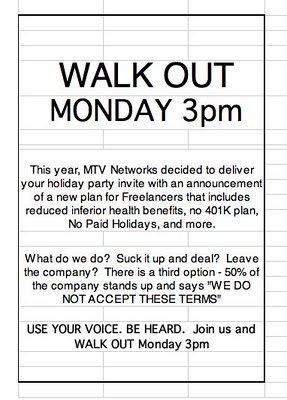I followed this week’s MTV “permalancers” walkout with great relish. I couldn’t help it. It reminded me of the CBC’s 2005 lockout. I know what you’re saying. “2005? That shit is ancient history!”
But I can’t help it. It gave this blog a reason to exist. Without that, there would be no me.
You think about that, Mr. CBC Executive. They call them permalancers in New York. We call them “casuals.” The idea is the same. Essentially they are people who want permanent jobs at a company, who are put into the category of “freelancers” for months or years on end. They go from contract to contract without getting hired. It’s how a company saves costs and remains flexible.
They call them permalancers in New York. We call them “casuals.” The idea is the same. Essentially they are people who want permanent jobs at a company, who are put into the category of “freelancers” for months or years on end. They go from contract to contract without getting hired. It’s how a company saves costs and remains flexible.
Hence “permanent freelancers.”
“I’ve worked here every day for three years — I’m not a freelancer,” Mr. Yonda said. “They just call us freelancers in order to bar us from getting the same benefits as employees.”
That’s about the size of it, Mr. Yonda.
The CBC lockout drove some people, myself included, to become bloggers in spite of themselves. We wrote about the CBC and the lockout and all sorts of things. And then people started reading these blogs. A lot of people. No one was more surprised by this than I was.
 Flash forward more than 2 years later, and not only are you confronted with the strange sight of a Viacom-owned blog covering the 5 best protest signs for the walkout of another Viacom-owned company, but at the centre of the whole thing was the Manhattan blog Gawker, which probably incited everything 2 Tuesdays ago with a post named The Viacom Permalance Slave System.
Flash forward more than 2 years later, and not only are you confronted with the strange sight of a Viacom-owned blog covering the 5 best protest signs for the walkout of another Viacom-owned company, but at the centre of the whole thing was the Manhattan blog Gawker, which probably incited everything 2 Tuesdays ago with a post named The Viacom Permalance Slave System.
You can follow the whole story on Gawker, all of it commented on by the people who are there and those that hate them, right to the final victory, when MTV gave in.
Now, the issue of casuals and permalancers was the whole point of the CBC 2005 lockout, and why the union was so angry, and why they were so happy about the outcome. They won, remember?
Not according to Rabinovitch in this weeks’ Playback.
“I could show you chapter and verse how we won hands down,” he says, pointing to the fact that the CBC secured the right to hire a fixed percentage of contract workers.
“I’d rather not have done it. It was very painful. But this place needed tough management, and that’s why I was sent here,”
Arnold Amber, lockout-era CMG president, begs to differ.
“On the weekend of the lockout, [CBC management] said they wanted to be able to convert 2,300 more jobs into contract jobs,” Amber recalls.
Eight weeks later, a final settlement forced on the CBC with the arrival of the NHL hockey season included the stipulation that CBC could hire one contract employee for every 10 people on staff. The CBC says it employs around 10,000 workers.
“If you wanted 2,300 [contract] workers, and only got 10-1, you figure out who won,” Amber concludes.
I’ll let these 2 guys bicker over who won and who lost. I know what I see with my own eyes. The CBC is hiring casuals like there’s a shortage of intelligent, passionate people who believe in public broadcasting and want to work at the CBC and don’t care so much about making a lot of money.
Er, wait a minute. There is a shortage.
Ancient history or not, we’re still living with it. And some of us still bear the wounds that proves that it happened.
And what is it they say about those that fail to learn from the past?

5 Comments
I suspect that quite a few of the nation’s j-school students might have some upsetting answers to your question. Upsetting to anyone looking to shut the place down, that is.
who would ever want to work for the CBC anyways?
If they learned from the past, they’d be unable to repeat what they see as not ever being mistakes in the future.
Hoping for the best for 2009, anyway.
Keep the current management and the current Govt. and there ain’t gonna be no 2009 for you folks.
2005 wasn’t that long ago and, if my read on the situation is right – 2009 is going to be far, far uglier.